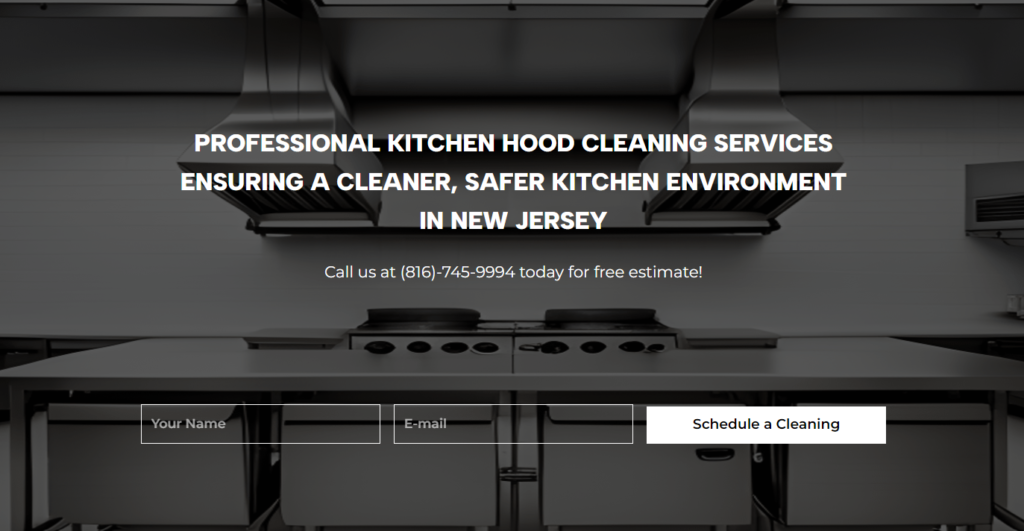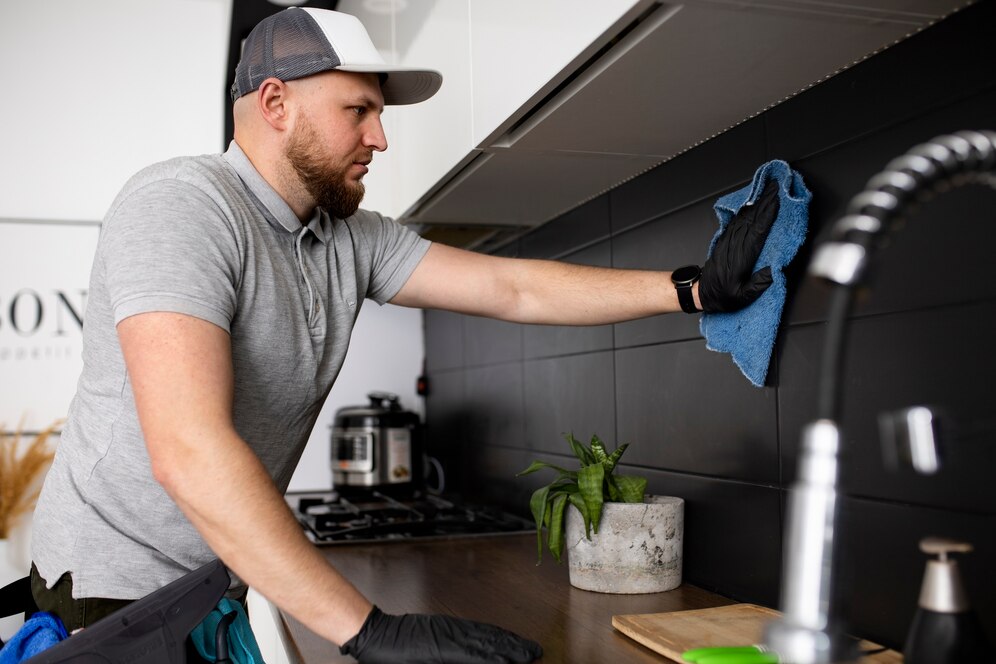In the bustling world of culinary excellence, behind every sizzling dish and savory delight lies a crucial but often overlooked secret to success: the cleanliness of the restaurant’s hood. Whether you’re a seasoned owner or a diligent manager, this comprehensive guide is your key to understanding the ins and outs of restaurant hood cleaning. In the following pages, we’ll unveil the essential knowledge and practical insights that can elevate your establishment’s hygiene standards to new heights, ensuring your patrons not only savor the flavors but also dine in an environment that speaks volumes about your commitment to excellence. So, let’s roll up our sleeves and dive into the often underestimated art and science of restaurant hood cleaning.
what is restaurant hood cleaning?
Restaurant hood cleaning, also known as kitchen exhaust cleaning, is a crucial maintenance process in the foodservice industry. It involves the thorough cleaning and maintenance of the kitchen’s ventilation system, including the exhaust hood, ductwork, fans, and filters. The primary purpose of restaurant hood cleaning is to remove grease, oil, and other flammable residues that accumulate in these components over time due to the cooking processes.
What Restaurant Kitchen Hood Cleaning Includes?
Here’s a breakdown of what restaurant hood cleaning typically includes:
- Restaurant Exhaust Hood Cleaning: The hood, which is located above cooking equipment such as stoves, grills, and fryers, is the first line of defense against capturing grease and smoke. It is cleaned both inside and outside to remove grease buildup.
- Ductwork Cleaning: The ductwork connects the exhaust hood to the exterior of the building. Grease and other contaminants can accumulate inside the ducts, posing a fire hazard. Cleaning involves scraping and removing these residues.
- Fan Cleaning: The exhaust fan, responsible for expelling air and odors from the kitchen, also accumulates grease and debris. It is cleaned and inspected for proper functioning.
- Filter Cleaning or Replacement: Grease filters within the exhaust system capture grease particles. These filters need regular cleaning or replacement to maintain efficient airflow and prevent the risk of fire.
Regular restaurant vent hood cleaning is essential for several reasons:
- Fire Safety: Accumulated grease is highly flammable and poses a significant fire hazard. Regular cleaning reduces this risk.
- Air Quality: Clean ventilation systems improve indoor air quality by removing smoke, odors, and particulate matter.
- Compliance: Many local health and fire codes require restaurants to undergo regular commercial vent hood cleaning to ensure compliance with safety regulations.
- Efficiency: A clean ventilation system operates more efficiently, reducing energy consumption and HVAC maintenance costs.
Why Kitchen Hood Cleaning is Important?
- Fire Prevention: Accumulated grease and oil in kitchen hoods, ducts, and exhaust systems are highly flammable. If a fire were to start in the kitchen, these greasy residues can ignite quickly and spread rapidly, leading to a catastrophic fire. Regular hood cleaning significantly reduces the risk of kitchen fires, protecting both the establishment and its occupants.
- Compliance with Regulations: Many local fire codes, health regulations, and insurance policies mandate regular kitchen hood cleaning. Failing to comply with these requirements can result in fines, closure orders, and increased insurance premiums. Regular cleaning ensures that your restaurant remains in good standing with these regulations.
- Improved Air Quality: A clean kitchen exhaust system effectively removes smoke, steam, odors, and airborne particles generated during cooking. This leads to better indoor air quality in the kitchen, making for a more comfortable and healthier environment for both staff and customers.
- Enhanced Kitchen Efficiency: Over time, grease buildup in the exhaust system can hinder airflow, reducing the efficiency of the ventilation system. A clean system operates more effectively, removing excess heat and moisture from the kitchen and reducing the load on HVAC systems. This can lead to energy savings and a more comfortable kitchen environment.
- Extended Equipment Lifespan: Grease accumulation not only poses a fire risk but can also damage kitchen equipment. Grease particles can be drawn into appliances, leading to clogs, reduced efficiency, and costly repairs. Regular hood cleaning helps extend the lifespan of kitchen equipment.
- Customer Experience: A clean and well-maintained kitchen reflects positively on your restaurant’s overall cleanliness and professionalism. Customers are more likely to return to an establishment with a reputation for hygiene and safety.
- Reduced Odors: Grease and food particles can create unpleasant odors in the kitchen and the dining area. A clean kitchen hood and exhaust system help control these odors, providing a more pleasant dining experience for customers.
How often should restaurant hood cleaning take?
The frequency of restaurant hood cleaning depends on various factors, including the type of cooking processes, the volume of cooking, and local regulations. Generally, there are three primary levels of hood cleaning frequency:
- Monthly Cleaning: Restaurants with high-volume cooking and heavy use of fryers, grills, and charbroilers typically require monthly hood cleaning. This level of frequency is common in busy, fast-food establishments or restaurants with 24/7 operations.
- Quarterly Cleaning: Many restaurants, especially those with moderate cooking volumes and less intense cooking methods, opt for quarterly hood cleaning. This frequency is suitable for most standard sit-down restaurants and cafés.
- Semi-Annual or Annually: Restaurants with low cooking volumes or those that primarily use ovens, microwaves, or steamers may choose to clean their hoods semi-annually or even annually. However, this should be assessed on a case-by-case basis, taking into consideration the accumulation of grease and local regulations.
It’s important to note that these are general guidelines, and specific requirements may vary depending on your location. Local fire departments, health departments, or other regulatory bodies may have specific guidelines or mandates regarding the frequency of restaurant hood cleaning. Always check and adhere to these regulations to ensure compliance.
Benefits of Restaurant hood cleaning?
Here are some of the best benefits of restaurant hood cleaning:
- Fire Prevention: One of the most critical benefits of restaurant hood cleaning is the prevention of kitchen fires. Grease and flammable residues that accumulate in the hood and exhaust system can ignite easily, leading to a dangerous and potentially catastrophic fire. Regular cleaning removes these fire hazards, reducing the risk of kitchen fires.
- Compliance with Regulations: Many local fire codes, health regulations, and insurance policies mandate regular hood cleaning. Staying compliant with these regulations helps you avoid fines, closure orders, and increased insurance premiums. It also demonstrates your commitment to safety and hygiene.
- Improved Air Quality: Hood cleaning ensures that the kitchen exhaust system functions effectively, removing smoke, steam, odors, and airborne particles generated during cooking. This leads to better indoor air quality in the kitchen, creating a more comfortable and healthier environment for staff and customers.
- Enhanced Kitchen Efficiency: A clean exhaust system operates more efficiently, effectively removing excess heat and moisture from the kitchen. This can reduce the workload on HVAC systems, leading to energy savings and a more comfortable kitchen environment.
- Extended Equipment Lifespan: Grease buildup in the exhaust system can damage kitchen equipment over time. Grease particles can be drawn into appliances, causing clogs and reducing efficiency. Regular hood cleaning helps extend the lifespan of your kitchen equipment, reducing the need for costly repairs or replacements.
- Customer Experience: A clean and well-maintained kitchen, including the hood and exhaust system, reflects positively on your restaurant’s overall cleanliness and professionalism. It helps create a positive impression on customers, and they are more likely to return to an establishment known for its hygiene and safety.
- Reduced Odors: Grease and food particles can create unpleasant odors in the kitchen and dining area. Hood cleaning helps control these odors, providing a more pleasant dining experience for customers.
- Energy Savings: An efficient kitchen exhaust system reduces the load on HVAC systems, resulting in energy savings and potentially lower utility bills.
- Insurance Benefits: Some insurance companies may offer reduced premiums to restaurants that maintain a regular hood cleaning schedule. This can lead to cost savings over time.
- Safety and Peace of Mind: Regular hood cleaning not only enhances safety but also provides peace of mind for restaurant owners and managers, knowing that they are taking proactive measures to protect their staff, customers, and business assets.
How much does restaurant hood cleaning cost?
The cost of commercial restaurant hood cleaning varies depending on a number of factors, including the size and complexity of the hood system, the frequency of cleaning, and the location of the restaurant. However, as a general rule of thumb, the average cost of restaurant hood cleaning is between $400 and $500 per cleaning.
Here are some of the factors that can affect the cost of restaurant hood cleaning:
- Size and complexity of the hood system: Larger and more complex hood systems will typically cost more to clean.
- Frequency of cleaning: The more often you have your hood system cleaned, the lower the cost per cleaning will be.
- Location of the restaurant: Restaurants in major metropolitan areas tend to pay more for hood cleaning services than restaurants in rural areas.
In addition to the base cost of the cleaning service, there may also be additional fees for things like travel expenses, access panel removal/reinstallation, and cleaning filters.
Why to Choose Atmax Kitchen Hood Cleaning as a Hood Cleaning Provider?

Here are some reasons why you should choose Atmax Kitchen Hood Cleaning as your hood cleaning provider:
- Experience: Atmax has been in the kitchen hood cleaning business for over more than 10 years and is one of the best restaurant hood cleaning service provider in New Jersey. They have the experience and expertise to clean any type of hood system, regardless of size or complexity.
- Qualifications: Atmax is certified by the National Fire Protection Association (NFPA) and the International Kitchen Exhaust Cleaning Association (IKECA). This means that their technicians are trained and qualified to clean kitchen hood systems to the highest standards.
- Safety: Atmax uses safe and effective cleaning products and procedures. They also have a team of experienced professionals who are trained to handle all aspects of kitchen hood cleaning equipment safely and efficiently.
- Customer satisfaction: Atmax is committed to providing their customers with the best possible service. They offer a satisfaction guarantee on all of their work, and they are always available to answer any questions or concerns that their customers may have.
Here are some additional reasons to choose Atmax Kitchen Hood Cleaning:
- They use eco-friendly and flame-proof cleaning products.
- They are available 24/7 for emergency cleanings.
- They are a family-owned and operated business.
- They offer competitive pricing.
- They have a good reputation in the industry.
To contact Atmax Kitchen Hood Cleaning, you can drop a mail on sales@atmaxfiltration.com or call on +1-816-745-9994.
Conclusion
In the heart of every thriving restaurant is a clean, well-maintained hood, safeguarding both your kitchen’s safety and your establishment’s reputation. As an owner or manager, embracing the significance of restaurant hood cleaning goes beyond compliance; it’s the key to culinary excellence and customer trust. So, remember, your hood is the silent guardian of your kitchen’s soul – nurture it, let it shine, and ensure every dining experience remains exceptional.
FAQs
NFPA 96 Requirements for Hood Cleaning
Cleaning Frequency: NFPA 96 specifies cleaning schedules based on cooking volume – typically every 3 months for high-volume and every 6 months for moderate-volume kitchens.
Certified Professionals: Cleaning must be done by certified professionals trained in accordance with NFPA 96 standards.
Cleaning Methods: Detailed guidelines outline the cleaning of hoods, ducts, fans, and components to remove grease and flammable residues.
Inspection: Regular inspections of the entire exhaust system are required to identify and address safety issues.
Documentation: Maintain records of all cleanings, inspections, and maintenance on-site as proof of compliance with NFPA 96.
The cost of hood cleaning can vary widely based on factors like kitchen size, cleaning frequency, and location. On average, it can range from $200 to $1,000 per cleaning. However, specific costs should be obtained through quotes from local certified cleaning services, as they can provide more accurate estimates based on your unique requirements.
A degreaser or all-purpose kitchen cleaner is typically best for cleaning a range hood. Look for products labeled safe for use on kitchen surfaces, and follow the manufacturer’s instructions for best results.
Atmax Kitchen Hood Cleaning is one of the best companies for restaurant kitchen hood cleaning. They have over more than 10 years of experience in the industry and are certified by the National Fire Protection Association (NFPA) and the International Kitchen Exhaust Cleaning Association (IKECA). This means that their technicians are trained and qualified to clean kitchen hood systems to the highest standards.

